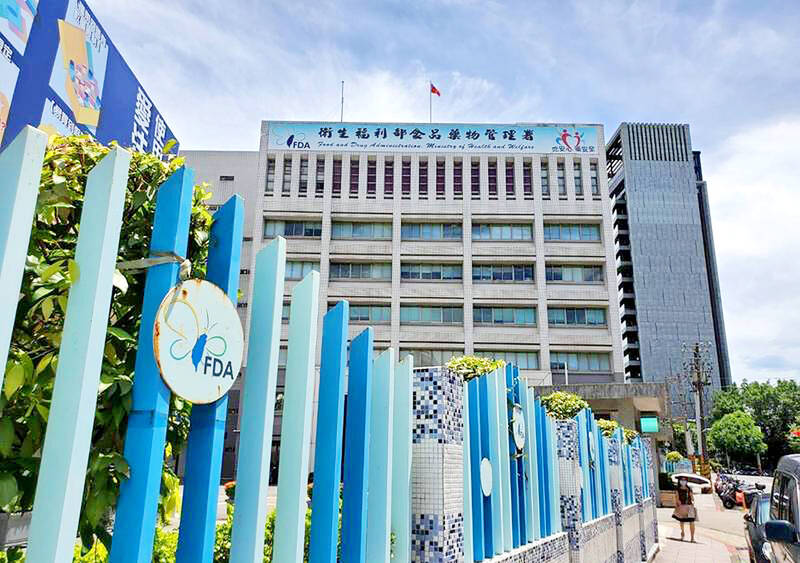The proportion of “national blood” in domestic blood-derived products would be ratcheted up over the next few years to reduce dependence on foreign sources and reinforce Taiwan’s medical resilience, the Food and Drug Administration (FDA) said on Saturday.
The Ministry of Health and Welfare has announced a development program, saying that domestic plasma demand would rise to 170 tonnes next year from 140 tonnes, with growing demand for immunoglobulins, albumin and factor VIII.
Although Taiwan currently has sufficient blood supply, it has long relied on imports for blood-derived products, it said.

Photo: Chung Li-hua, Taipei Times
As foreign blood products carry the risks of contracting foreign infectious diseases and running short of supply during emergencies, securing “national blood” — blood donated by Taiwanese and its derived products — for domestic use is crucial, the ministry said.
FDA Deputy Director-General Wang Te-yuan (王德原) said the ministry’s data on projected demand were derived from reported usage under the National Health Insurance program and the number of blood products’ lot releases.
Increasing the proportion of domestic blood products is significant, as import shortages could occur during wars or pandemics due to other countries’ export controls, he said.
As Taiwan has yet to have a blood product manufacturer, the government has since 2007 allowed the Taiwan Blood Services Foundation to commission CSL Behring to produce national blood-based products in Australia, Wang said.
Of the total of 71 licenses approved for blood products circulated in Taiwan, two immunoglobulin licenses and an albumin license are for national blood-derived products, while the others are for those manufactured based on non-national blood, he said.
Currently, immunoglobulins derived from national blood plasma account for only half of the domestic demand, while albumin contributes to a still lower proportion of less than 10 percent, Wang said.
Foreign plasma products might not be as efficacious as those based on national blood plasma due to epidemiological differences, he said, adding that boosting national blood-derived products is the key to solid medical resilience.
The FDA announced draft amendments to Blood Donors’ Health Standards (捐血者健康標準) on Oct. 24 last year, which would raise donor age eligibility to 70 and relax body weight limits, with expectations that more blood would be donated to increase the percentage of national blood-derived products, Wang said.
Taiwan Society of Blood Transfusion executive director Lo Shih-chi (羅仕錡) said that clinical indications of immunoglobulin continue to expand and its usage increases every year, making it one of the most important blood products for treating autoimmune diseases, such as thrombocytopenia and systemic lupus erythematosus.
Albumin and factor VIII usages have been relatively stable and are recommended for people with liver diseases and hemophilia, he added.
Taipei Blood Center planning division director-general Liu Chun-hung (劉俊宏) said each pack of donated blood can be separated into plasma and red blood cells.
Plasma extracted from national blood is estimated to be enough to meet next year’s extra 30 tonnes of plasma demand, as red blood cells are in higher demand while plasma is largely left in storage, he said.

Chinese Nationalist Party (KMT) Chairman Eric Chu (朱立倫), spokeswoman Yang Chih-yu (楊智伃) and Legislator Hsieh Lung-chieh (謝龍介) would be summoned by police for questioning for leading an illegal assembly on Thursday evening last week, Minister of the Interior Liu Shyh-fang (劉世芳) said today. The three KMT officials led an assembly outside the Taipei City Prosecutors’ Office, a restricted area where public assembly is not allowed, protesting the questioning of several KMT staff and searches of KMT headquarters and offices in a recall petition forgery case. Chu, Yang and Hsieh are all suspected of contravening the Assembly and Parade Act (集會遊行法) by holding

PRAISE: Japanese visitor Takashi Kubota said the Taiwanese temple architecture images showcased in the AI Art Gallery were the most impressive displays he saw Taiwan does not have an official pavilion at the World Expo in Osaka, Japan, because of its diplomatic predicament, but the government-backed Tech World pavilion is drawing interest with its unique recreations of works by Taiwanese artists. The pavilion features an artificial intelligence (AI)-based art gallery showcasing works of famous Taiwanese artists from the Japanese colonial period using innovative technologies. Among its main simulated displays are Eastern gouache paintings by Chen Chin (陳進), Lin Yu-shan (林玉山) and Kuo Hsueh-hu (郭雪湖), who were the three young Taiwanese painters selected for the East Asian Painting exhibition in 1927. Gouache is a water-based

Taiwan would welcome the return of Honduras as a diplomatic ally if its next president decides to make such a move, Minister of Foreign Affairs Lin Chia-lung (林佳龍) said yesterday. “Of course, we would welcome Honduras if they want to restore diplomatic ties with Taiwan after their elections,” Lin said at a meeting of the legislature’s Foreign Affairs and National Defense Committee, when asked to comment on statements made by two of the three Honduran presidential candidates during the presidential campaign in the Central American country. Taiwan is paying close attention to the region as a whole in the wake of a

OFF-TARGET: More than 30,000 participants were expected to take part in the Games next month, but only 6,550 foreign and 19,400 Taiwanese athletes have registered Taipei city councilors yesterday blasted the organizers of next month’s World Masters Games over sudden timetable and venue changes, which they said have caused thousands of participants to back out of the international sporting event, among other organizational issues. They also cited visa delays and political interference by China as reasons many foreign athletes are requesting refunds for the event, to be held from May 17 to 30. Jointly organized by the Taipei and New Taipei City governments, the games have been rocked by numerous controversies since preparations began in 2020. Taipei City Councilor Lin Yen-feng (林延鳳) said yesterday that new measures by